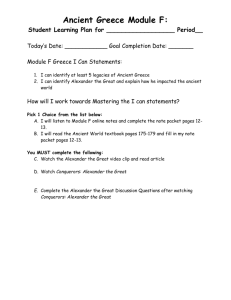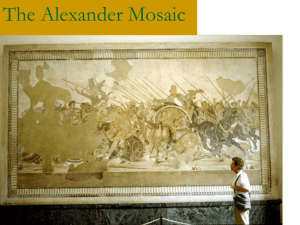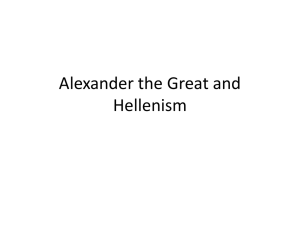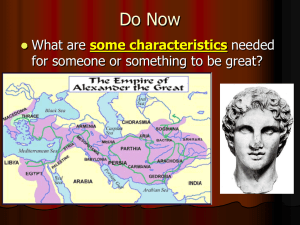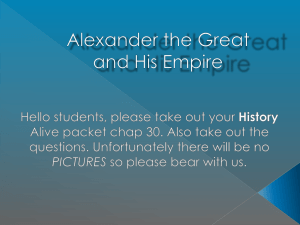fys_haskell_10 - Southwestern University
advertisement
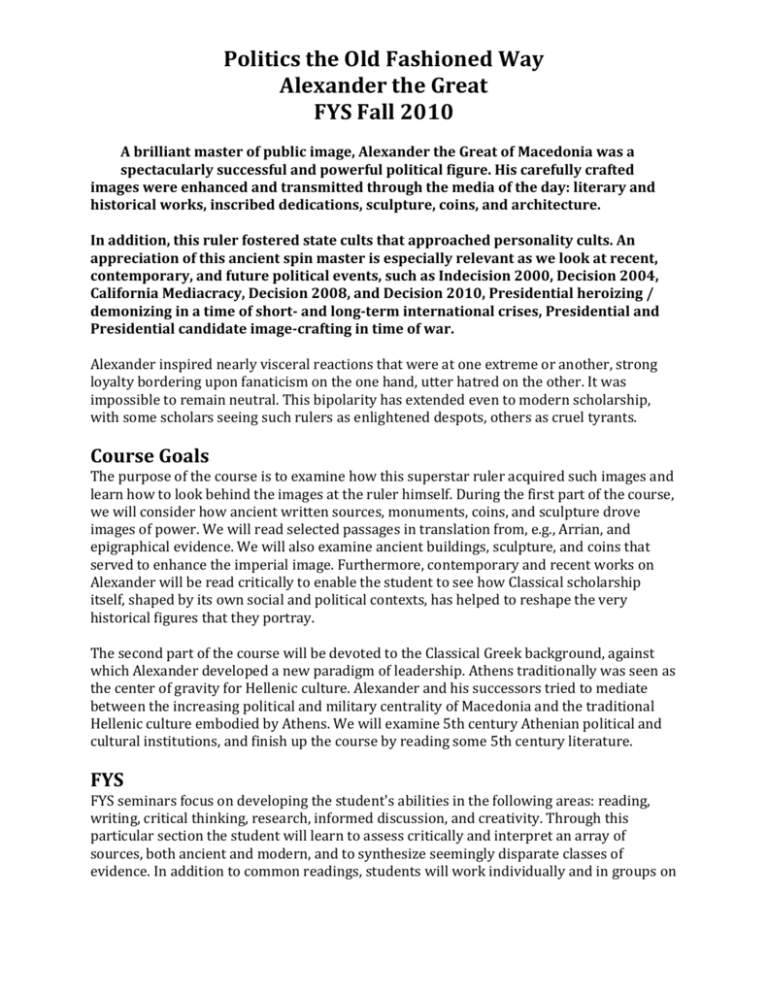
Politics the Old Fashioned Way Alexander the Great FYS Fall 2010 A brilliant master of public image, Alexander the Great of Macedonia was a spectacularly successful and powerful political figure. His carefully crafted images were enhanced and transmitted through the media of the day: literary and historical works, inscribed dedications, sculpture, coins, and architecture. In addition, this ruler fostered state cults that approached personality cults. An appreciation of this ancient spin master is especially relevant as we look at recent, contemporary, and future political events, such as Indecision 2000, Decision 2004, California Mediacracy, Decision 2008, and Decision 2010, Presidential heroizing / demonizing in a time of short- and long-term international crises, Presidential and Presidential candidate image-crafting in time of war. Alexander inspired nearly visceral reactions that were at one extreme or another, strong loyalty bordering upon fanaticism on the one hand, utter hatred on the other. It was impossible to remain neutral. This bipolarity has extended even to modern scholarship, with some scholars seeing such rulers as enlightened despots, others as cruel tyrants. Course Goals The purpose of the course is to examine how this superstar ruler acquired such images and learn how to look behind the images at the ruler himself. During the first part of the course, we will consider how ancient written sources, monuments, coins, and sculpture drove images of power. We will read selected passages in translation from, e.g., Arrian, and epigraphical evidence. We will also examine ancient buildings, sculpture, and coins that served to enhance the imperial image. Furthermore, contemporary and recent works on Alexander will be read critically to enable the student to see how Classical scholarship itself, shaped by its own social and political contexts, has helped to reshape the very historical figures that they portray. The second part of the course will be devoted to the Classical Greek background, against which Alexander developed a new paradigm of leadership. Athens traditionally was seen as the center of gravity for Hellenic culture. Alexander and his successors tried to mediate between the increasing political and military centrality of Macedonia and the traditional Hellenic culture embodied by Athens. We will examine 5th century Athenian political and cultural institutions, and finish up the course by reading some 5th century literature. FYS FYS seminars focus on developing the student's abilities in the following areas: reading, writing, critical thinking, research, informed discussion, and creativity. Through this particular section the student will learn to assess critically and interpret an array of sources, both ancient and modern, and to synthesize seemingly disparate classes of evidence. In addition to common readings, students will work individually and in groups on specific topics, e.g. W. Tarn on Alexander the Great (Tarn is strongly in the pro-Alexander camp), and will learn how to evaluate and interpret such sources. You will, therefore, be engaged in research, critical reading, and critical writing. While a small part of class time will be devoted to providing the basic background for Classical-Hellenistic Greece, most class time will be used for class discussion and for research project presentations. Mechanics In terms of the semester schedule, the course is loaded pretty heavily at the front end. We meet for many hours during Orientation Week. Your first graded work (apart from class participation) is due on (Aug. 21) Aug. 26. This means that you will have feedback - a good thing! - on college level work very early in the semester. Students in the course are expected to adhere to the provisions of the SU Honor Code, and to add and sign the pledge: ""I have acted with honesty and integrity in producing this work and am unaware of anyone who has not." While you may study together, ultimately all work (except for group projects) must be your work alone. Southwestern University will make reasonable accommodations for students with documented disabilities. To arrange accommodations students should contact the Assistant Director of Access and Academic Resources within the Center for Academic Success (Prothro Center room 120; phone 863-1286; e-mail carterk@southwestern.edu). Students seeking accommodations should notify the Assistant Director of Access and Academic Resources at least two weeks before services are needed. It is the student's responsibility to discuss any necessary accommodations with the appropriate faculty member. Requirements Examinations. There will be two during the semester, including the final. The first exam covers material relating to Alexander the Great and includes objective questions (for example, fill in the blank) and essays. The final contains objective questions relating to material after the first exam, and essay questions relating to material from the entire course, including Presentations #2 (see below). Please note that make-up exams are the rare exception, not the rule, and are allowed at the discretion of the instructor; such matters must be arranged in advance of the regularly scheduled exam time. Papers/Projects. There will be two short papers/projects. Paper #1 is to be about 5 pages in length. Paper/Project #2 may be a traditional paper or a multi-media presentation. A list of suggested topics will be provided by the instructor, although students may propose their own topics; student-proposed topics must be approved by the instructor in advance. Presentations. Each student will prepare and present to the class two oral presentations. Students will work in groups or three or four. The first presentation will focus on Alexander, the second on a study of how a later (ancient through contemporary) program compares to image promotion of Alexander. Students may make these presentations with computer support (e.g. web browser or Microsoft Powerpoint) (the instructor will provide help with technological issues). Included in the documentation submitted separately to the instructor is to be an outline of each student's contribution to the project. Attendance is mandatory for all students at these classes and all material presented becomes course content for all students. Diversity on Campus: An FYS Conversation. A requirement for all FYS sections, this folds nicely into the academic content for the course (Alexander's notion of cosmopolitanism). Class participation/Attendance. Students are expected to attend class. Lectures/ discussions are not re-runs of assignments. The grade for preparation/class participation will be based upon attendance and upon participation in class discussion; class discussion means "quality" and not necessarily "quantity." Class discussion also reveals to a certain extent preparation. Participation in Presentations will also affect this grade. In class, students should feel free to express their own opinions on various matters related to the course and to ask questions. Students' interpretations need not necessarily be the same as those of the instructor. As long as interpretations are based upon reasoned assessments of the evidence (literary, historical, archaeological), they are as valid as the instructor's. This concept has been reinforced through cooperative work of SU students and faculty, which resulted in a provision of the SU Academic Rights for Students. It bears repeating here: Faculty members should encourage free thought and expression both in the classroom and out. Students are entitled to disagree with interpretation of data or views of a faculty member and reserve judgment in matters of opinion, but this disagreement does not excuse them from learning the content of any course for which they are enrolled or from demonstrating skills and competencies required by a faculty member. Students should be evaluated solely on academic performance. Note: Make-up exams, presentations, and late papers are the exception, and not the rule, and permission will not be granted automatically. Make-ups must be arranged with the instructor in advance of the regularly scheduled time, and will be given (or not) at the discretion of the instructor. Grading Graded work: Exams Exam #1 Final Exam Papers Paper #1 Paper #2 Presentations Presentation #1 Presentation #2 Class participation 20% 20% 10% 10% 10% 10% 20% Final Grades The plus and minus grading system, in effect at Southwestern, will be used for final grades. Semester % averages will translate to the following letter grades: INCLUSIVE GPA POINTS GRADE % RANGE EQUIV. A+ 96.7-100.0 4.00 A 93.4-96.6 4.00 A90.0-93.3 3.67 B+ 86.7-89.9 3.33 B 83.4-86.6 3.00 B80.0-83.3 2.67 C+ 76.7-79.9 2.33 C 73.4-76.6 2.00 C70.0-73.3 1.67 D+ 66.7-69.9 1.33 D 63.4-66.6 1.00 D60.0-63.3 0.67 F 0.0-59.9 0.00 Learning Outcomes We can articulate learning outcomes through integrating course objectives with Bloom's taxonomy (old version): [http://www.techdis.ac.uk/resources/files/Blooms%20taxonomy.png] We start at the bottom: Knowledge: to gain control of the "data set" Comprehension: to begin to see connections, coherence Application: to identify historical problems/issues susceptible to analysis Analysis: with the application of data and comprehension, to compare, contrast, differentiate, etc. Synthesis: After pulling it all together, to appraise, argue, support, evaluate "Evaluation:" Draw meaningful conclusions Schedule 16 August - 22 August Day Topic Assignment (due by beginning of class) Monday Aug. 16 10-12 Class 1 P. Green, Alexander of Macedon (summer reading) Tuesday Aug. 17 9-12 Class 2 Ancient Romm, pp. 1-16, 24-32 Interpretatio ns of Alexander: Literature I; Library Module, 10:00 Wednesd NO CLASS ay Aug. 18 http://www.southwestern.edu/departments/classics/fys/wilken source.html Thursday Aug. 19 9-12 Class 3 Ancient Borza, Intro. to Wilken, Source Problem Interpretatio ns of Alexander: Literature II Friday Aug. 20 10-12 Class 4 Reading Arrian, Introduction ancient text; "SU Experience" (11:30) Saturday Aug. 21 Rough draft due, 5 pm (see link below) Romm #1 PDF document Paper #1, Rough draft Assignment 23 August - 29 August Tuesday, Class 5 Ancient Interpretations of Alexander: Literature; Unity of Humankind Romm #2, pp. 70-74, 94-107, 157-164; Chios Inscriptions PDF document Thursday, Class 6 Unity of Humankind (cont.): Complexity of Identity (see link below) Ancient Interpretations of Alexander: Ancient Iconography I Paper #1 due (submission link below) Chios Inscriptions PDF document Complexity of Identity PDF document Paper #1 Assignment Caskey, "The Early Helladic Period in the Argolid," Hesperia 29 (1960), 285-303 PDF document 30 August - 5 September Tuesday, Class 7 Iconography II: Rome: Howe, Powerhouses (see link below) Thursday, Class 8 ancient and contemporary politics: Washington Post (text version) Howe, Powerhouses: the Seaside Villas of Campania and the Power Culture of Rome PDF document Roman Power Powerpoint presentation 6 September - 12 September Tuesday, Class 9 Vergina Read Andronikos, 218-224 Intercultural (10 am) Thursday, Class 10 Student presentations (Alexander) (see below) comparing and contrasting Louis XIV of France and Alexander and their image making/self portrayal (Kristina, Katie Nash, Marina, Kristin) comparing the iconographic propaganda of Alexander with that of modern day politicians, especially Obama (Shelby, Sarah, Katie Philo, Claire) whether or not alexander the great was a tyrant (the guys) FYROM Powerpoint presentation Presentation #1 Resource Evaluation of pres. Assignment This week 13 September - 19 September Tuesday Exam #1 Thursday, Class 11 Athenian Democracy Intro. (see link below) Introduction PDF document 20 September - 26 September Tuesday, Class 12 Athenian Democracy II Thucydides, Pericles' Funeral Oration Diversity, Dorothy Lord Center Community Room http://www.wsu.edu/%7Edee/GREECE/PERICLES.HTM Thursday, Class 13 Paper #2, Rough Draft (5 pm) http://www.wsu.edu/%7Edee/GREECE/PERICLES.HTM Paper #2, rough draft Assignment 27 September - 3 October Tuesday Student presentations Thursday CLA, Olin Computer Lab 113 Paper #2, due 5 pm Paper #2 Assignment 4 October - 10 October Tuesday Student Presentations Thursday Final Exam

